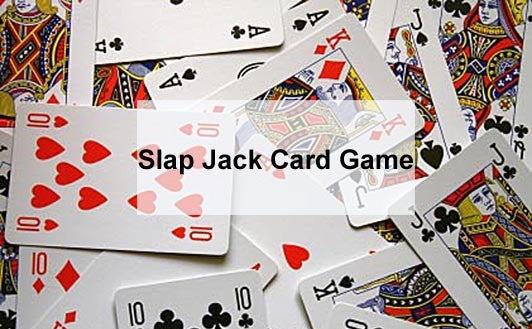
Simple Play Therapy Technique Using Playing Cards by Jennifer Taylor, LCSW, RPT
A simple play therapy intervention for children with impulsive behaviors can be played with a traditional deck of playing cards. For years, I thought that everyone knew about this game. I’m sure many of you are familiar. I have been surprised at the number of children (and adults) that have never heard of it or played it. The game is called Slap Jack.
Slap Jack Rules:
- Start with a normal deck of 52 playing cards.
- Divide the cards in half between two players and keep them face down.
- The first player flips over a card from their deck into the middle.
- The second player then flips over their first card from their deck.
- Continue flipping cards until a Jack (of any suit) comes up.
- The first person to SLAP (with their hand) and cover the Jack gets the entire pile of cards.
- Play continues until one person has the entire deck of 52 cards.
Extra Rules:
- If you slap a card that is not a Jack, the other person gets that entire pile.
- If there is a tie, continue until the next Jack comes up OR decide your own tie breaking activity.
How Slap Jack Helps Impulsive Kids
- Simple turn taking activity promotes social skills
- Increases ability to pay attention long enough to notice what card is flipped up
- Improves ability to discriminate between small details (a Jack versus another face card)
- Builds frustration tolerance when the other person “wins” a pile
- Offers multiple opportunities to win/lose a stack of cards so it builds frustration tolerance for kids who give up easily or get mad when they lose

Sensory Benefits:
In addition to the basic benefits, the sensory experience of slapping the card and the sound that it makes increases the fun level and engages the entire body. The game can be played fast or slow and can be completed easily in a regular play therapy session.
Blended with Child Centered Principles
Since this is a structured activity, it doesn’t really meet the criteria for child-centered play therapy. However, like any directive activity, you can always infuse some child centered reflections throughout the game. You could reflect things like:
- You have having a hard time waiting for your turn
- You don’t like the rules of this game
- You are excited that you beat me to that Jack
- You are disappointed that you were slower that time
- This game was hard at first and now it’s easier.
It Becomes a Family Play Therapy Technique
This game is so easy to learn and play that kids can then teach their parents or siblings. You can use it with multiple kids in a group setting or in a family session. (You would just divide the cards by the number of people). You just might need more than one deck of cards if you play with more people.
Treatment Plan: Goals and Documentation
You can tie this intervention into a treatment plan for children with ADHD with very simple documentation. You treatment plan might say,
“Reduce impulsive behaviors (interrupting, getting up from seat, taking things from others, name calling) with peers by 75% over the next 30 days.”
Slap Jack addresses all of those concerns because you can notice how many prompts the child needs to follow the directions, remain on task with the game, slaps a card that is not a Jack) and then note the change over time. Your progress note might say something like,
“Used card game, Slap Jack, as a directive play therapy intervention to reduce impulsive behaviors and improve executive functioning skills. Child required 3+ prompts at the beginning of intervention to complete task, had difficulty with waiting for his turn, and made multiple errors during game play. Over the session, child increased his ability to remain in seat without any prompts to 15 minutes, successfully practiced turn taking without requiring any redirection, and practice winning/losing without any negative or inappropriate name calling.”
Finally, as with any game, this is an opportunity to build rapport with the child and you can talk about a variety of other topics (school, home, hobbies, friends) while you are playing and it gives the child a chance to talk without feeling pressured to discuss specific behaviors.

Jennifer Taylor is a Licensed Clinical Social Worker (LCSW) and Registered Play Therapist (RPT) specializing in individual, group , and family therapy with a speciality in Play Therapy. She is certified in TF-CBT (Trauma Focused Cognitive Behavioral Therapy). She maintains a private practice in Cordova, TN that serves Memphis and all surrounding areas (Germantown, Collierville, Bartlett, Arlington, Millington, and Olive Branch, MS). Jennifer has 15 years experience as a social worker and has worked primarily in the child welfare field. In addition to being a prominent relationship therapist, Jennifer has presented at National conferences and to general audiences speaking on the topics of Play Therapy. She currently works as an Adjunct Professor at the University of Memphis and the University of West Florida teaching graduate level play therapy courses. Jennifer is an active member of the Association for Play Therapy and a graduate of the Play Therapy Leadership Program
Learn more about Jennifer here!


Leave a comment